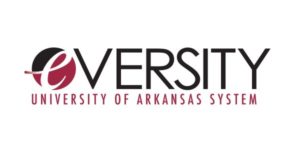 FORT SMITH – The Board of Trustees of the University of Arkansas today approved the creation of a new online university named the University of Arkansas System eVersity and dedicated to serving adult students who are unable to access traditional higher education campuses.
FORT SMITH – The Board of Trustees of the University of Arkansas today approved the creation of a new online university named the University of Arkansas System eVersity and dedicated to serving adult students who are unable to access traditional higher education campuses.
The board endorsed a proposal advanced by UA System President Dr. Donald R. Bobbitt and his staff to establish the eVersity and authorized the system administration to begin planning for academic governance of the institution through a consortium of existing UA System institutions.
“The University of Arkansas System has a rich portfolio of talent that resides in the faculty and staff of our 17 institutions and divisions,” Bobbitt said. “I’m confident that we will, and in fact, must, bring this array of talent to bear on Governor Beebe’s challenge to double the number of Arkansans with a post-high-school credential.”
The eVersity will seek to address educational attainment needs in Arkansas by attracting adult students who are currently turning to for-profit online institutions and those adults who have completed some college but not earned a degree, according to the plan presented by Dr. Michael Moore, vice president for academic affairs of the system. The core principles of the institution include providing high quality courses, affordable tuition and workforce relevant degree programs, along with promoting student success in programs.
“For many students, the optimum experience is to learn intensively under the mentorship of the exceptional faculty we have at each institution. However, for those students for which that is not possible, the eVersity will provide a much needed option,” Bobbitt said.
A planning phase for governance and academic programming will involve interested faculty from across the UA System, said Moore, who has led the planning efforts for the eVersity.
“The eVersity will be a collaborative effort drawing on the strength and expertise found in our existing UA institutions,” Moore said. “Faculty members at our colleges and universities will specify degree requirements, will develop the course work in concert with expert instructional designers and will teach our courses. In this respect, we will draw an important distinction from many of the existing fully online universities that rely almost exclusively on adjunct faculty.”
There are currently more than 80 out-of-state institutions, including many for-profit schools, operating more than 1,000 degree programs in Arkansas, according to the Arkansas Department of Higher Education, and more such institutions will seek approval to offer degrees from the Arkansas Higher Education Coordinating Board next month.
Arkansas needs more than 519,000 additional college graduates to meet workforce needs by 2025, according to the Lumina Foundation, which estimates there are more than 358,000 adults in the state who have completed some college but not earned a credential.
The goal of the project is to complement the efforts of the traditional institutions in the UA System, which offer some targeted online programs among traditional face-to-face on-campus instruction, Moore said.
The initiative is a response to a resolution passed by the board in November 2012 directing the system president to coordinate and expand online education in the system.
Moore and Dr. Daniel Ferritor, Vice President for learning technologies, presented the proposal for the institution at a meeting of the board on the campus of the University of Arkansas at Fort Smith.